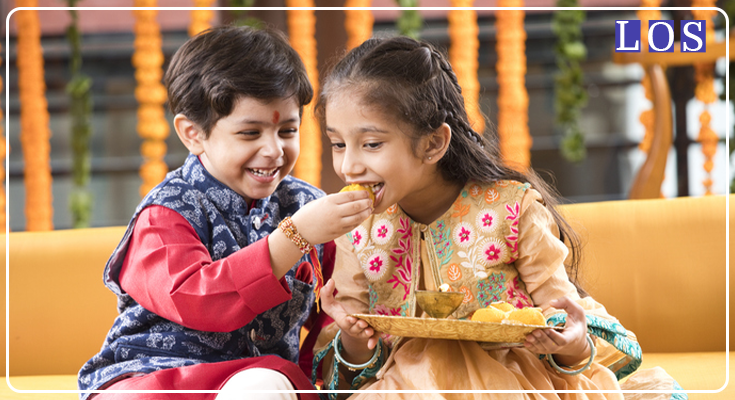Raksha Bandhan, also known as Rakhi, is one of the most cherished festivals in Hindu culture, celebrated with great fervor across India and other parts of the world. This festival is a celebration of the unique and unbreakable bond between brothers and sisters. It symbolizes love, care, respect, and the duty of protection that siblings share.
The term “Raksha Bandhan” translates to “the bond of protection,” where “Raksha” means protection, and “Bandhan” means bond. The festival is marked by the ritual of sisters tying a sacred thread, called a Rakhi, around the wrists of their brothers. This thread is not just a piece of adornment; it is a symbol of the sister’s love and prayers for her brother’s well-being, and the brother’s lifelong vow to protect her.
Mythological Origins
The origins of Raksha Bandhan can be traced back to various legends and stories from Hindu mythology. One of the most popular tales is that of Lord Krishna and Draupadi. According to the Mahabharata, when Lord Krishna injured his finger, Draupadi tore a piece of her saree and tied it around his finger to stop the bleeding. Touched by her gesture, Krishna promised to protect her whenever she needed it. This story beautifully captures the essence of Raksha Bandhan—protection and care.
Another legend speaks of Queen Karnavati of Mewar who sent a Rakhi to Emperor Humayun, seeking his help and protection. Moved by her trust and the sanctity of the Rakhi, Humayun marched with his troops to defend her kingdom. This historical account emphasizes the power of the Rakhi as a symbol of trust and protection beyond biological relationships.
The Rituals and Traditions
Raksha Bandhan is traditionally celebrated on the full moon day of the Hindu month of Shravan (July-August). On this day, sisters prepare a special Rakhi thali, which includes the Rakhi, rice, diya (lamp), and sweets. The ceremony begins with the sister applying a tilak (a mark) on her brother’s forehead, followed by the tying of the Rakhi around his wrist. As she ties the Rakhi, she prays for his long life and happiness. In return, the brother gives his sister gifts and promises to protect her under all circumstances.
In modern times, the celebration of Raksha Bandhan has expanded beyond blood relations. It has become a symbol of respect, care, and solidarity, where Rakhi is tied to anyone considered worthy of protection—be it a friend, a mentor, or even members of the armed forces.
Modern Celebrations
While the essence of Raksha Bandhan remains the same, the way it is celebrated has evolved with time. Today, Rakhi comes in various designs, from traditional threads to modern bracelets adorned with charms and jewels. E-commerce platforms have made it easier for siblings living far apart to send Rakhis and gifts across the globe, ensuring that the bond is celebrated no matter the distance.
The festival also promotes unity and harmony in society, as it transcends religious and cultural boundaries. In many parts of India, Raksha Bandhan is celebrated not just by Hindus but by people of different faiths, reflecting the inclusive and unifying spirit of the festival.
Raksha Bandhan is more than just a festival; it is a celebration of love, protection, and the deep bond that siblings share. It is a day to honor the unique relationship between brothers and sisters, a relationship that is built on trust, care, and mutual respect. As we celebrate Raksha Bandhan, we are reminded of the importance of these values in our lives and the joy that comes from nurturing and protecting the ones we love.
So, whether you’re near or far from your sibling, take this opportunity to express your love and commitment to each other. Tie that Rakhi, exchange those gifts, and most importantly, cherish the bond that makes Raksha Bandhan such a special occasion.
